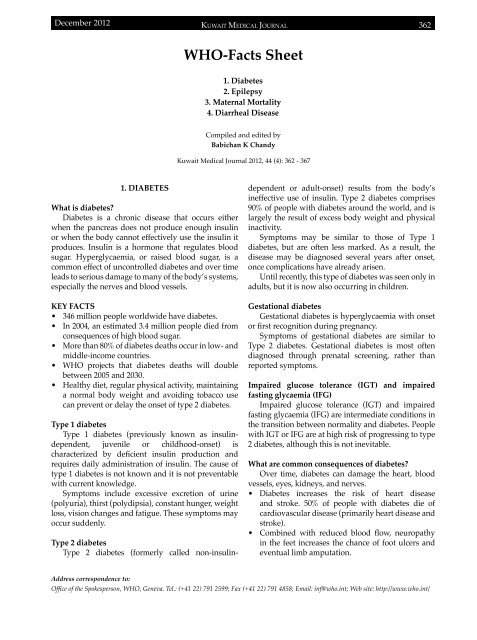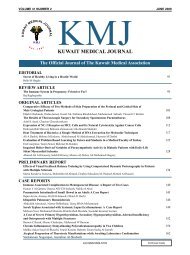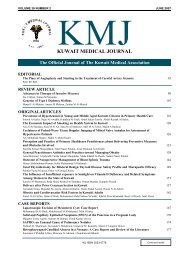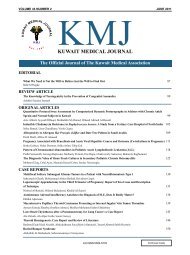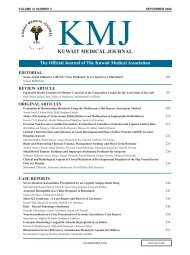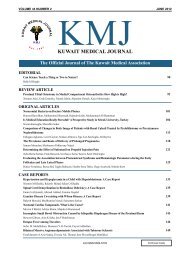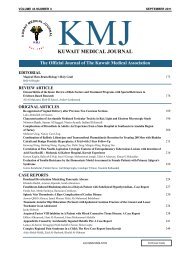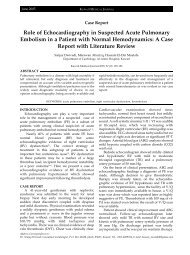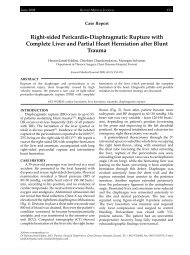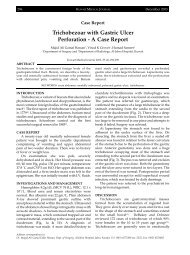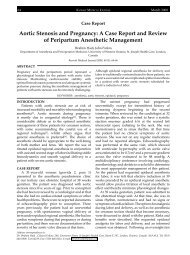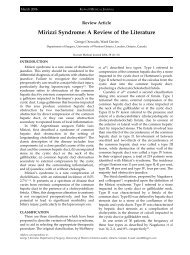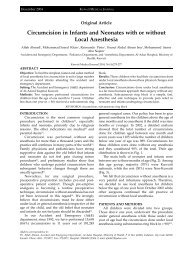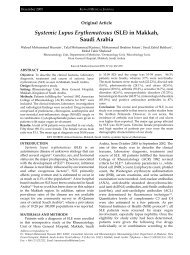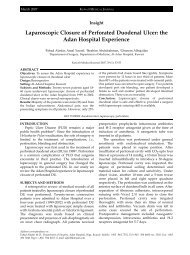Vol 44 # 4 December 2012 - Kma.org.kw
Vol 44 # 4 December 2012 - Kma.org.kw
Vol 44 # 4 December 2012 - Kma.org.kw
You also want an ePaper? Increase the reach of your titles
YUMPU automatically turns print PDFs into web optimized ePapers that Google loves.
<strong>December</strong> <strong>2012</strong><br />
KUWAIT MEDICAL JOURNAL 362<br />
WHO-Facts Sheet<br />
1. Diabetes<br />
2. Epilepsy<br />
3. Maternal Mortality<br />
4. Diarrheal Disease<br />
Compiled and edited by<br />
Babichan K Chandy<br />
Kuwait Medical Journal <strong>2012</strong>, <strong>44</strong> (4): 362 - 367<br />
1. DIABETES<br />
What is diabetes?<br />
Diabetes is a chronic disease that occurs either<br />
when the pancreas does not produce enough insulin<br />
or when the body cannot effectively use the insulin it<br />
produces. Insulin is a hormone that regulates blood<br />
sugar. Hyperglycaemia, or raised blood sugar, is a<br />
common effect of uncontrolled diabetes and over time<br />
leads to serious damage to many of the body’s systems,<br />
especially the nerves and blood vessels.<br />
KEY FACTS<br />
• 346 million people worldwide have diabetes.<br />
• In 2004, an estimated 3.4 million people died from<br />
consequences of high blood sugar.<br />
• More than 80% of diabetes deaths occur in low- and<br />
middle-income countries.<br />
• WHO projects that diabetes deaths will double<br />
between 2005 and 2030.<br />
• Healthy diet, regular physical activity, maintaining<br />
a normal body weight and avoiding tobacco use<br />
can prevent or delay the onset of type 2 diabetes.<br />
Type 1 diabetes<br />
Type 1 diabetes (previously known as insulindependent,<br />
juvenile or childhood-onset) is<br />
characterized by deficient insulin production and<br />
requires daily administration of insulin. The cause of<br />
type 1 diabetes is not known and it is not preventable<br />
with current knowledge.<br />
Symptoms include excessive excretion of urine<br />
(polyuria), thirst (polydipsia), constant hunger, weight<br />
loss, vision changes and fatigue. These symptoms may<br />
occur suddenly.<br />
Type 2 diabetes<br />
Type 2 diabetes (formerly called non-insulindependent<br />
or adult-onset) results from the body’s<br />
ineffective use of insulin. Type 2 diabetes comprises<br />
90% of people with diabetes around the world, and is<br />
largely the result of excess body weight and physical<br />
inactivity.<br />
Symptoms may be similar to those of Type 1<br />
diabetes, but are often less marked. As a result, the<br />
disease may be diagnosed several years after onset,<br />
once complications have already arisen.<br />
Until recently, this type of diabetes was seen only in<br />
adults, but it is now also occurring in children.<br />
Gestational diabetes<br />
Gestational diabetes is hyperglycaemia with onset<br />
or first recognition during pregnancy.<br />
Symptoms of gestational diabetes are similar to<br />
Type 2 diabetes. Gestational diabetes is most often<br />
diagnosed through prenatal screening, rather than<br />
reported symptoms.<br />
Impaired glucose tolerance (IGT) and impaired<br />
fasting glycaemia (IFG)<br />
Impaired glucose tolerance (IGT) and impaired<br />
fasting glycaemia (IFG) are intermediate conditions in<br />
the transition between normality and diabetes. People<br />
with IGT or IFG are at high risk of progressing to type<br />
2 diabetes, although this is not inevitable.<br />
What are common consequences of diabetes?<br />
Over time, diabetes can damage the heart, blood<br />
vessels, eyes, kidneys, and nerves.<br />
• Diabetes increases the risk of heart disease<br />
and stroke. 50% of people with diabetes die of<br />
cardiovascular disease (primarily heart disease and<br />
stroke).<br />
• Combined with reduced blood flow, neuropathy<br />
in the feet increases the chance of foot ulcers and<br />
eventual limb amputation.<br />
Address correspondence to:<br />
Office of the Spokesperson, WHO, Geneva. Tel.: (+41 22) 791 2599; Fax (+41 22) 791 4858; Email: inf@who.int; Web site: http://www.who.int/


